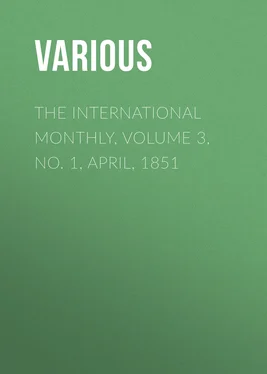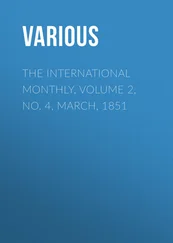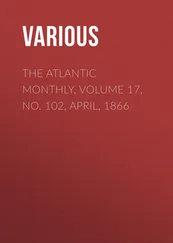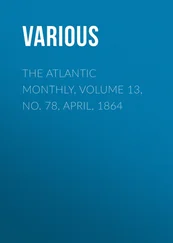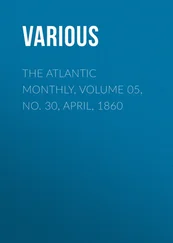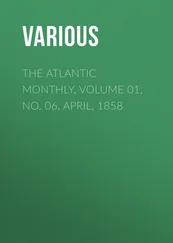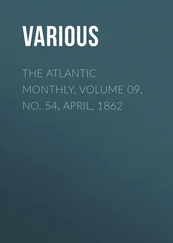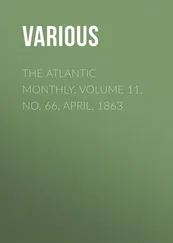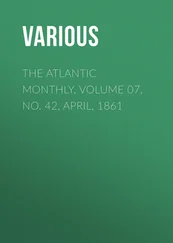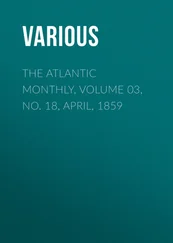Various - The International Monthly, Volume 3, No. 1, April, 1851
Здесь есть возможность читать онлайн «Various - The International Monthly, Volume 3, No. 1, April, 1851» — ознакомительный отрывок электронной книги совершенно бесплатно, а после прочтения отрывка купить полную версию. В некоторых случаях можно слушать аудио, скачать через торрент в формате fb2 и присутствует краткое содержание. Жанр: foreign_antique, periodic, foreign_edu, на английском языке. Описание произведения, (предисловие) а так же отзывы посетителей доступны на портале библиотеки ЛибКат.
- Название:The International Monthly, Volume 3, No. 1, April, 1851
- Автор:
- Жанр:
- Год:неизвестен
- ISBN:нет данных
- Рейтинг книги:3 / 5. Голосов: 1
-
Избранное:Добавить в избранное
- Отзывы:
-
Ваша оценка:
- 60
- 1
- 2
- 3
- 4
- 5
The International Monthly, Volume 3, No. 1, April, 1851: краткое содержание, описание и аннотация
Предлагаем к чтению аннотацию, описание, краткое содержание или предисловие (зависит от того, что написал сам автор книги «The International Monthly, Volume 3, No. 1, April, 1851»). Если вы не нашли необходимую информацию о книге — напишите в комментариях, мы постараемся отыскать её.
The International Monthly, Volume 3, No. 1, April, 1851 — читать онлайн ознакомительный отрывок
Ниже представлен текст книги, разбитый по страницам. Система сохранения места последней прочитанной страницы, позволяет с удобством читать онлайн бесплатно книгу «The International Monthly, Volume 3, No. 1, April, 1851», без необходимости каждый раз заново искать на чём Вы остановились. Поставьте закладку, и сможете в любой момент перейти на страницу, на которой закончили чтение.
Интервал:
Закладка:
"Of the editions hitherto published in America, Mr. Verplanck's is the only one, so far as we know, that is at all free from the accumulated emendations of preceding editors. Adopting, in the main, the text of Mr. Collier, he brought to the work, however, his own excellent taste and judgment, wherein he as far surpasses the English editor as he necessarily falls short of him in such external advantages as the libraries, public and private, of England alone can supply. And Mr. Collier's text is indeed remarkably pure: nor, perhaps, can any other man of modern times be named, to whom Shaksperian literature is, on the whole, so largely indebted. How much he has done, need not be dwelt upon here, as the results thereof will be found scattered all through this edition. Yet it seems not a little questionable whether both he and Knight have not fallen into a serious error; though it must be confessed that such error, if it be one, is on the right side, inasmuch as their fidelity to the original text extends to the adopting, sometimes of probable, sometimes of palpable, or nearly palpable misprints. In these Mr. Verplanck has judiciously deviated from his English model, and his fine judgment appears to equal advantage in what he adopts and in what he rejects. Of his critical remarks it is enough at present to express the belief, that in this department he has no rival in this country, and will not soon be beaten. Further acknowledgments, both to him and to the other three editors named, will be duly and cheerfully made, as the occasions for them shall arise....
"In the Introductions our leading purpose is to gather up all the historical information that has yet been made accessible, concerning the times when the several plays were written and first acted, and the sources whence the plots and materials of them were taken. It will be seen that in the history of the poet's plays, the indefatigable labors of Mr. Collier and others, often resulting in important discoveries, have wrought changes amounting almost to a total revolution, since the Chiswick edition was published. And we dwell the more upon what Shakspeare seems to have taken from preceding writers, because it exhibits him, where we like most to consider him, as holding his unrivalled inventive powers subordinate to the higher principles of art. Besides, if Shakspeare be the most original of writers, he is also one of the greatest of borrowers; and as few authors have appropriated so freely from others, so none can better afford to have his obligations in this kind made known."…
THE STONES OF VENICE—RELIGION, GLORY, AND ART
Mr. John Ruskin, the "Oxford Student," whose Modern Painters and Seven Lamps of Architecture have made for him the best fame in the literature of art, has just completed the most remarkable of his works, The Stones of Venice , and from advance sheets of it (for which we are indebted to Mr. John Wiley, his American publisher), we present some of his preliminary and more general observations, indicating his great argument that the decline of the political prosperity of Venice was coincident with that of her domestic and individual religion. Popular as the previous works of Mr. Ruskin have been, we cannot doubt that this splendid performance will be the most read and most admired of all.
"Since the first dominion of men was asserted over the ocean, three thrones, of mark beyond all others, have been set upon its sands: the thrones of Tyre, Venice, and England. Of the First of these great powers only the memory remains; of the Second, the ruin; the Third, which inherits their greatness, if it forget their example, may be led through prouder eminence to less pitied destruction. The exaltation, the sin, and the punishment of Tyre have been recorded for us, in perhaps the most touching words ever uttered by the Prophets of Israel against the cities of the stranger. But we read them as a lovely song; and close our ears to the sternness of their warning: for the very depth of the Fall of Tyre has blinded us to its reality, and we forget, as we watch the bleaching of the rocks between the sunshine and the sea, that they were once 'as in Eden, the garden of God.' Her successor, like her in perfection of beauty, though less in endurance of dominion, is still left for our beholding in the final period of her decline: a ghost upon the sands of the sea, so weak—so quiet,—so bereft of all but her loveliness, that we might well doubt, as we watched her faint reflection in the mirage of the lagoon, which was the City, and which the Shadow. I would endeavor to trace the lines of this image before it be for ever lost, and to record, as far as I may, the warning which seems to me to be uttered by every one of the fast-gaining waves, that beat, like passing bells, against the Stones of Venice.
"It would be difficult to overrate the value of the lessons which might be derived from a faithful study of the history of this strange and mighty city: a history which, in spite of the labor of countless chroniclers, remains in vague and disputable outline,—barred with brightness and shade, like the far away edge of her own ocean, where the surf and the sandbank are mingled with the sky. The inquiries in which we have to engage will hardly render this outline clearer, but their results will, in some degree, alter its aspect; and, so far as they bear upon it at all, they possess an interest of a far higher kind than that usually belonging to architectural investigations. I may, perhaps, in the outset, and in few words, enable the general reader to form a clearer idea of the importance of every existing expression of Venetian character through Venetian art and of the breadth of interest which the true history of Venice embraces, than he is likely to have gleaned from the current fables of her mystery or magnificence.
"Venice is usually conceived as an oligarchy: she was so during a period less than the half of her existence, and that including the days of her decline; and it is one of the first questions needing severe examination, whether that decline was owing in any wise to the change in the form of her government, or altogether, as assuredly in great part, to changes in the character of the persons of whom it was composed. The state of Venice existed Thirteen Hundred and Seventy-six years, from the first establishment of a consular government on the island of the Rialto, to the moment when the General-in-chief of the French army of Italy pronounced the Venetian republic a thing of the past. Of this period, Two Hundred and Seventy-six years were passed in a nominal subjection to the cities of old Venetia, especially to Padua, and in an agitated form of democracy, of which the executive appears to have been intrusted to tribunes, chosen, one by the inhabitants of each of the principal islands. For six hundred years, during which the power of Venice was continually on the increase, her government was an elective monarchy, her King or doge possessing, in early times at least, as much independent authority as any other European sovereign, but an authority gradually subjected to limitation, and shortened almost daily of its prerogatives, while it increased in a spectral and incapable magnificence. The final government of the nobles, under the image of a king, lasted for five hundred years, during which Venice reaped the fruits of her former energies, consumed them,—and expired.
"Let the reader therefore conceive the existence of the Venetian state as broadly divided into two periods: the first of nine hundred, the second of five hundred years, the separation being marked by what was called the 'Serrar del Consiglio; that is to say, the final and absolute distinction of the nobles from the commonalty, and the establishment of the government in their hands, to the exclusion alike of the influence of the people on the one side, and the authority of the doge on the other. Then the first period, of nine hundred years, presents us with the most interesting spectable of a people struggling out of anarchy into order and power; and then governed, for the most part, by the worthiest and noblest man whom they could find among them, called their Doge or Leader, with an aristocracy gradually and resolutely forming itself around him, out of which, and at last by which, he was chosen; an aristocracy owing its origin to the accidental numbers, influence, and wealth, of some among the families of the fugitives from the older Venetia, and gradually organizing itself, by its unity and heroism, into a separate body. This first period includes the Rise of Venice, her noblest achievements, and the circumstances which determined her character and position among European powers; and within its range, as might have been anticipated, we find the names of all her hero princes,—of Pietro Urseolo, Ordalafo Falier, Domenico Michieli, Sebastiano Ziani, and Enrico Dandolo.
Читать дальшеИнтервал:
Закладка:
Похожие книги на «The International Monthly, Volume 3, No. 1, April, 1851»
Представляем Вашему вниманию похожие книги на «The International Monthly, Volume 3, No. 1, April, 1851» списком для выбора. Мы отобрали схожую по названию и смыслу литературу в надежде предоставить читателям больше вариантов отыскать новые, интересные, ещё непрочитанные произведения.
Обсуждение, отзывы о книге «The International Monthly, Volume 3, No. 1, April, 1851» и просто собственные мнения читателей. Оставьте ваши комментарии, напишите, что Вы думаете о произведении, его смысле или главных героях. Укажите что конкретно понравилось, а что нет, и почему Вы так считаете.
